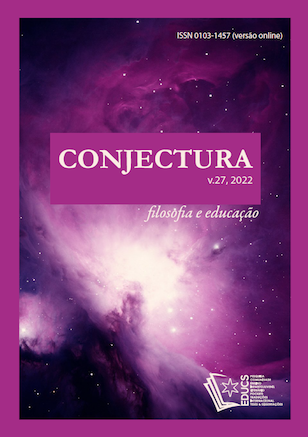As opiniões reputadas (endoxa) no contexto atual
DOI:
https://doi.org/10.18226/21784612.v27.e022034Resumo
A proposta deste ensaio é somente indicar uma possível contribuição da noção de endoxa de Aristóteles para o debate ético-político contemporâneo. A definição de endoxa dada no início dos Tópicos permite compreender a natureza, a função e o seu valor na argumentação dialética, que é diferente da demonstração científica do silogismo teórico e, também, permite identificar as diferenças entre as meras opiniões (doxa) e as opiniões reputadas (endoxa). Os endoxa funcionam como um primeiro princípio da demonstração e têm valor elevado de verdade, ainda que não sejam sempre verdadeiros e, também, se distinguem dos paradoxos. A concepção de endoxa em Tópicos I parece ser suficiente para perceber que Aristóteles fornece subsídios conceituais para melhor compreendermos os tipos de discurso e argumentos que podem contribuir para melhor orientar o debate e a tomada de decisão ético-política também em nosso contexto atual.
Palavras chaves: Aristóteles, argumentos dialéticos, endoxa, verdade, debate ético-político.
Referências
ARISTÓTELES. Ética a Nicomaco. (Os Pensadores), trad. Leonel Vallandro e Gerd Bornheim, São Paulo: Abril Cultural, 1979.
ARISTÓTELES. Tópicos. Obras Completas de Aristóteles. Trad. J. A. Campos, Lisboa: Imprensa Nacional Casa da Moeda, 2007.
ARISTÓTELES. Metafísica. Introdução, tradução, comentário de G. Reale e tradução para o português por M. Perine. 2. ed., São Paulo: Loyola, 2005, vol. 2.
ARISTOTE. Seconds analytiques. Introduction, traduction, notes, bibliographie et index par Pierre Pellegrin. s/l: GF Flammarion, 2005.
ANSCOMBE, G. E. M. “Modern Moral Philosophy”. In Philosophy 33, 1958, 1-19.
BAUMAN, Zygmunt. Modernidade Líquida . Rio de Janeiro: Jorge Zahar Ed., 2001.
BERTI, Enrico. “Gli endoxa in Aristotele e oggi”. Endoxa – Prospettive sul presente, 2, no. 3 (2017): 15-21, site: www.endoxai.net
DEBORD, Guy. A Sociedade do Espetáculo. Rio de Janeiro: Contrapont, 2007.
ECO, Umberto. “Umberto Eco attacca i social: «Internet ha dato diritto di parola agli imbecilli»”, em 11 Giugno 2015. Disponível no site: https://www.ilmessaggero.it/societa/persone/umberto_eco_attacca_social_network_imbecilli-1085803.html
LIPOVETSKY, Gilles. O império do efêmero: a moda e seu destino nas sociedades modernas. São Paulo: Cia. das Letras, 1989.
SAINSBURY, R. M. Paradoxes. Cambridge: Cambridge University Press, 1996.
SEMINARA, Lauretta. Carattere e Funzione degli Endoxa in Aristotele. Napoli: Edizioni La Città del Sole, 2002.
STEFANI, Jaqueline. O conhecimento em Aristóteles. Caxias do Sul: EDUCS, 2018.
WEIL, Eric. Aristotelica. Trad. it. a cura di L. Sichirollo. Milano: Guerini e Associati, 1990, p. 57-103.
ZILLIG, Raphael. “Dialética e o método da ética em Aristóteles”. In Journal of Ancient Philosophy. São Paulo, v.12, n.1. p. 129-172, 2018.
Downloads
Publicado
Como Citar
Edição
Seção
Licença
1. A publicação dos originais implicará a cessão dos direitos autorais à revista Conjectura.
2. Os textos não poderão ser reproduzidos sem autorização da revista depois de aceitos.

Este trabalho está licenciado com uma Licença Creative Commons - Atribuição 4.0 Internacional.









